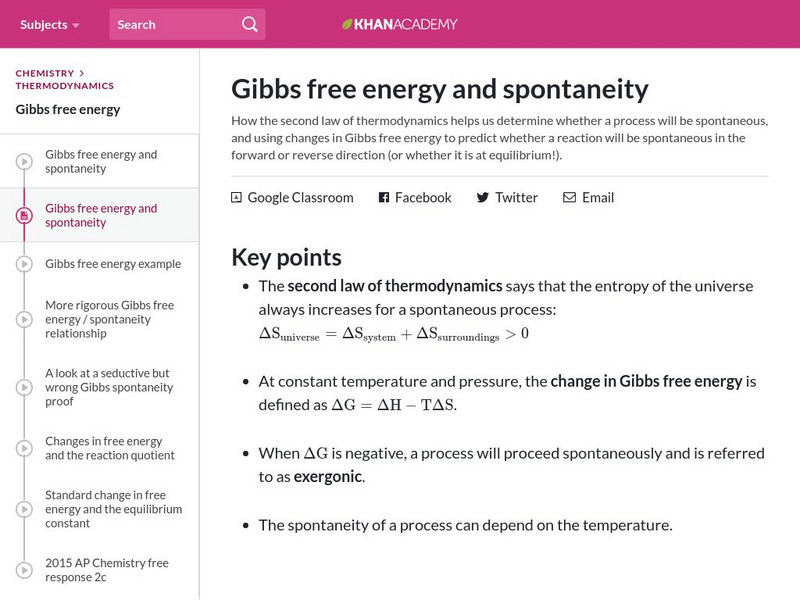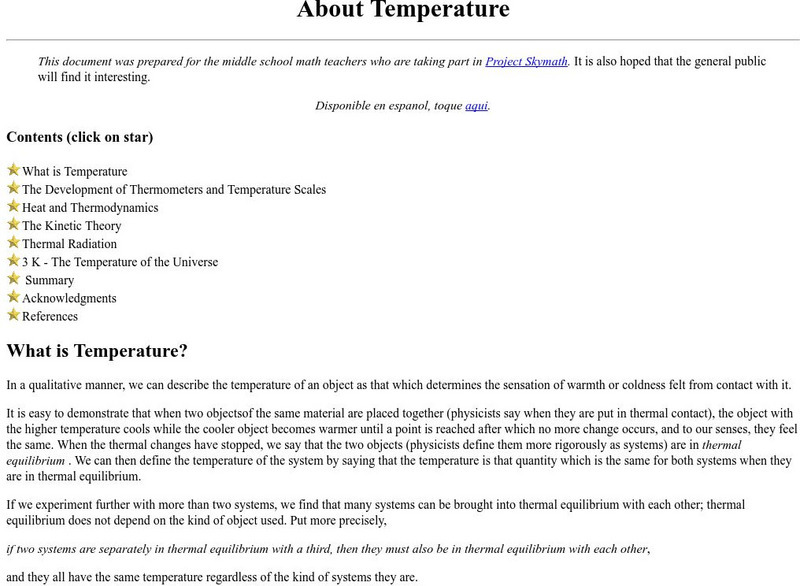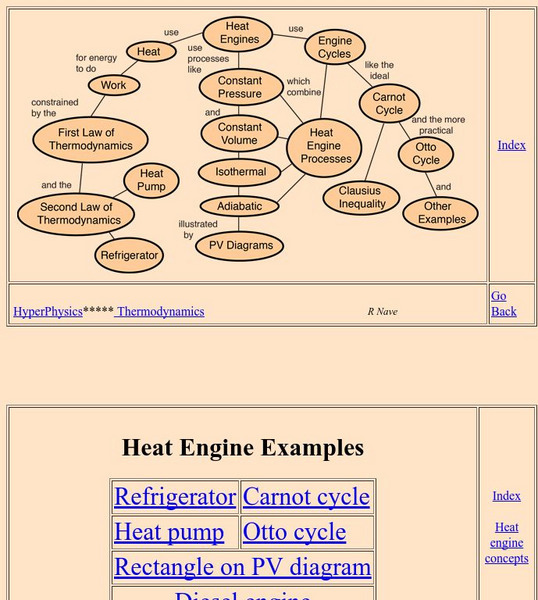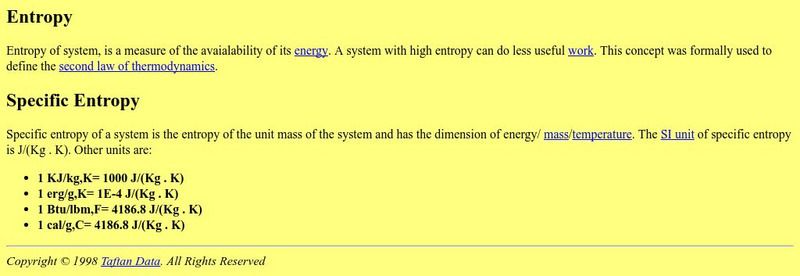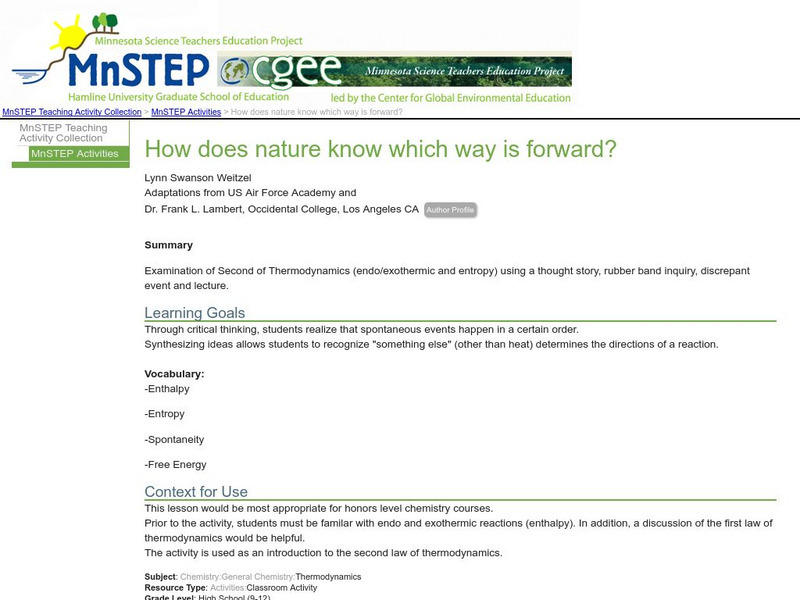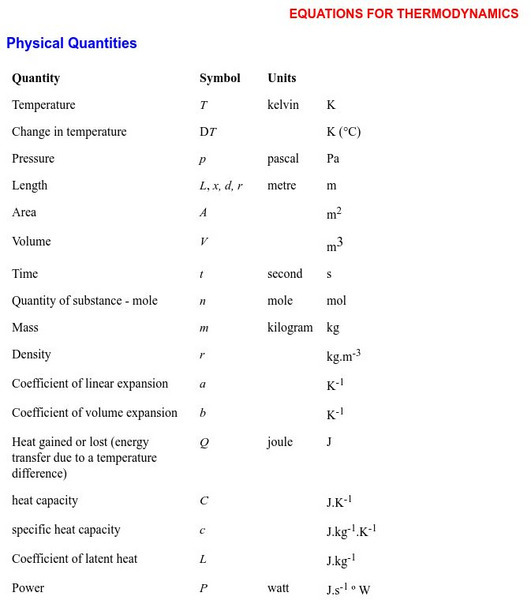Hi, what do you want to do?
Texas Education Agency
Texas Gateway: Thermodynamics: Conceptual Questions
This is a list of 37 question that cover the major concepts presented in Chapter 15: Thermodynamics from the AP Physics online text.
Texas Education Agency
Texas Gateway: Thermodynamics: Problems and Exercises
This is a list of 67 problems and exercises to solve based on the content presented in Chapter 15: Thermodynamics from the AP Physics online text.
University of Sydney (Australia)
University of Sydney: Structure and Properties of Materials/thermal Physics
An exhaustive set of "lecture notes" on various topics in thermal physics (including thermal expansion). Explanations are well done and more interesting than most. Includes both a mathematical and conceptual treatment of topics. Humor,...
University of Sydney (Australia)
Thermal Physics Module: Heat Engines [Pdf]
The second law of thermodynamics and the concept of entropy is applied to the topic of heat engines. The Carnot and Stirling engine are discussed. Efficiency is explained and an equation is derived.
Chiral Publishing
Chiral Publishing: An Introduction to Chemistry: Effect of Temperature on Solubility
This online textbook section explains how the solubility of gases in a liquid decrease as the temperature increases. Use a chart and example to help understand how the Second Law of Thermodynamics has an effect on this. Also find links...
Other
Web Dictionary of Cybernetics:thermodynamics
A definition of thermodynamics and its laws from the Web Dictionary of Cybernetics and Systems. Part of an online dictionary of scientific terms. Includes hypertext links to other definitions are provided.
Texas Education Agency
Texas Gateway: Thermodynamics: Summary
This is a summary of each of the sections in Chapter 15: Thermodynamics from the AP Physics online text.
Khan Academy
Khan Academy: Gibbs Free Energy and Spontaneity
Explanation of Gibbs Free Energy and Spontaneity. Includes formulas and examples.
Famous Scientists
Famous Scientists: William Thomson
Learn about William Thompson's important work in the mathematical analysis of electricity and formulation of the first and second laws of thermodynamics, and did much to unify the emerging discipline of physics in its modern form.
University Corporation for Atmospheric Research
Ucar: About Temperature
This site from the University Corporation of Atmospheric Research provides a lengthy page covering numerous topics including the difference between heat and temperature, the use of different temperature scales, thermal expansion, how a...
Georgia State University
Georgia State University: Hyper Physics: Heat Engine Cycle
The heat engine cycle is defined and discussed. So pressure-volume diagrams are introduced and their use in depicting the cycles of a heat engine is demonstrated. Informative graphics are accompanied by reason-filled explanations.
Georgia State University
Georgia State University: Hyper Physics: Heat Engine Concepts
An indexing page for the HyperPhysics site. The page contains a concept map of links to a variety of other pages which discuss concepts related to heat engines. All pages contain informative graphics and excellent explanations.
Georgia State University
Georgia State University: Hyper Physics: Entropy
This informative site is from Georgia State University. The tendency of nature to move towards a more disordered state in an isolated system, a concept known as entropy, is discussed. This concept is well-depicted in meaningful diagrams.
Georgia State University
Georgia State University: Hyper Physics: Heat Engine Concepts: The Otto Cycle
Schematic diagrams illustrating the operation of a four-stroke engine cycle. Interactive buttons allow you to step through the various steps of each engine cycle. Each graphic is accompanied by an excellent explanation.
Georgia State University
Georgia State University: Hyper Physics: Heat Engine Concepts: Carnot Cycle
The Carnot cycle is described, illustrated and explained. The Carnot efficiency equation is given and interactive JavaScript form allows the visitor to investigate the effect of the reservoir temperature and the sink temperature upon the...
Georgia State University
Georgia State University: Hyper Physics: Heat Pump
Heat flow from a hot region to a cold region is described and explained. Applications of this phenomenon (specifically heat pumps and refrigerators) are discussed. Excellent graphics.
TED Talks
Ted: Ted Ed: Why Don't Perpetual Motion Machines Ever Work?
Netta Schramm describes the pitfalls of perpetual motion machines.
Concord Consortium
Concord Consortium: Molecular Workbench: Loschmidt's Paradox
Use this simulation to observe how Loschmidt's Paradox affects the entropy of an isolated system.
NASA
Nasa: From Stargazers to Starships: Energy
Demonstrates how principles of kinetic energy, potential energy and energy conservation can be used to determine the speed of a descending object if given its initial height. Further discussion of other topics such as heat and...
Other
Applied Thermodynamics: Entropy
Entropy is defined and discussed at this site from Applied Thermodynamics. The equation for this mathematical quantity is given and explained. Some unit information concerning entropy is provided.
Science Education Resource Center at Carleton College
Serc: How Does Nature Know Which Way Is Forward?
Through critical thinking, students realize that spontaneous events happen in a certain order. This lesson plan presents an examination of the Second Law of Thermodynamics using a thought story, rubber band inquiry, discrepant event and...
University of Sydney (Australia)
Equations for Thermodynamics
An exhaustive list of equations and formulas which are commonly used in thermal physics (including equations for triple point). Equations are organized according to category. Meaning of the symbols is clearly stated.
Walter Fendt
Walter Fendt: Apps Zur Physik
This site, in German, offers numerous apps that illustrate common physics principles. Apps are organized into categories: mechanics, oscillations and waves, electrodynamics, optics, thermodynamics, the theory of relativity, physics of...
University of Sydney (Australia)
Thermal Physics Module: Refrigerators and Heat Pumps [Pdf]
Refrigerators and heat pumps are described. Their operation is explained and the variables which improve their efficiency is discussed.







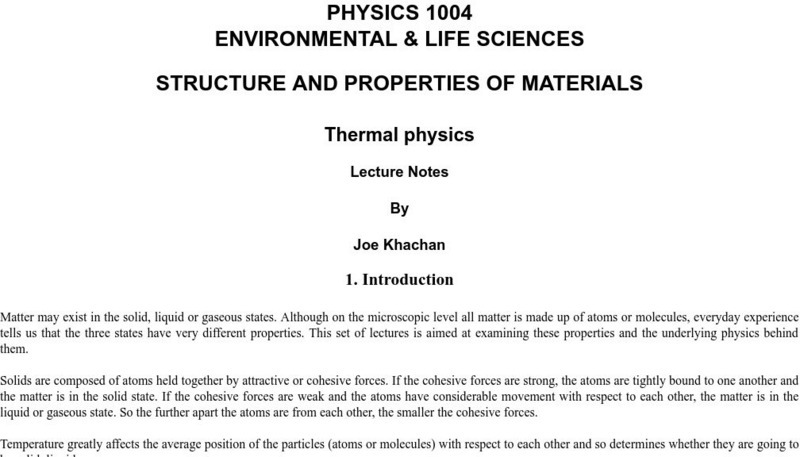
![Thermal Physics Module: Heat Engines [Pdf] Website Thermal Physics Module: Heat Engines [Pdf] Website](https://static.lp.lexp.cloud/images/attachment_defaults/resource/large/FPO-knovation.png)


